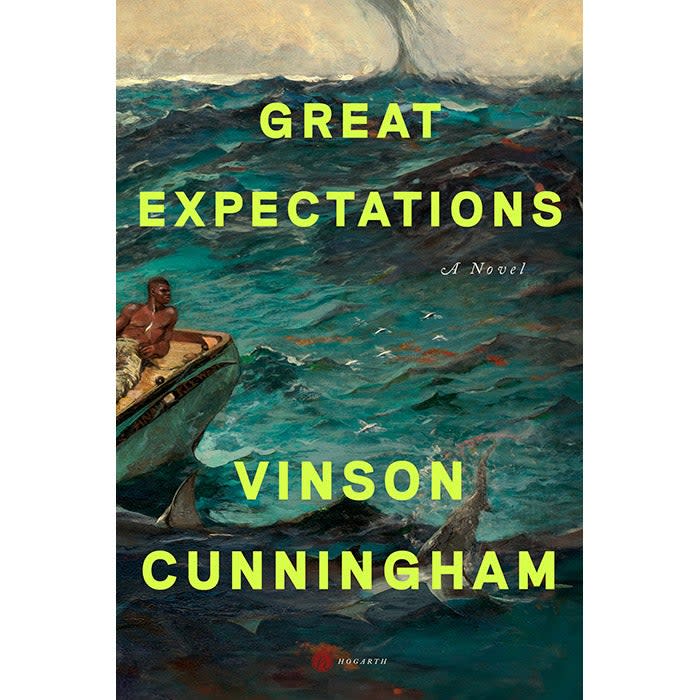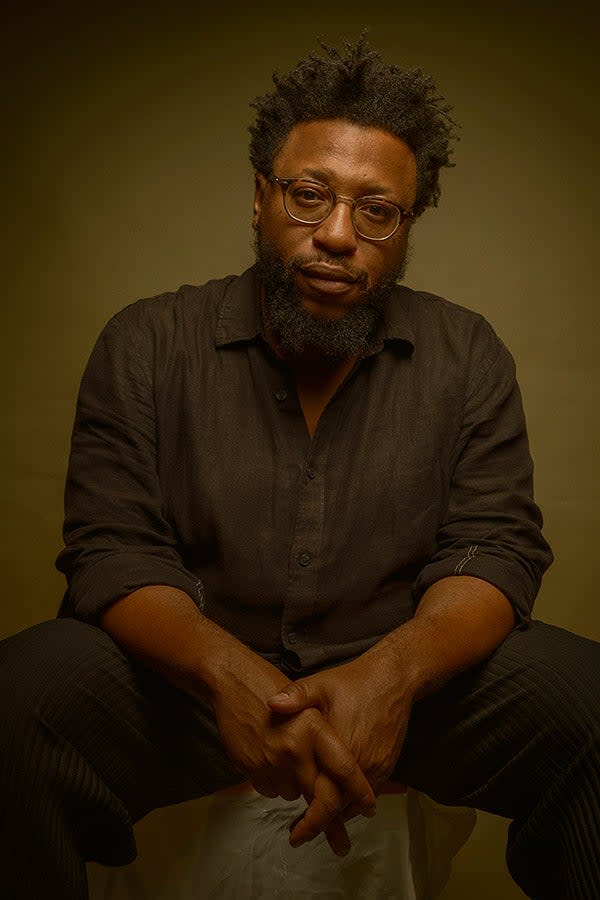One of the Best Novels of the Year So Far Is Set Behind the Scenes at a Familiar Presidential Campaign
- Oops!Something went wrong.Please try again later.
Early in Vinson Cunningham’s sophisticated debut novel—cheekily titled Great Expectations—the narrator, David Hammond, stands in the front room of a Brooklyn Heights brownstone, watching his boss give a speech. The house belongs to a publisher, a “white woman in soft clothes,” well-off enough to own a Jenny Holzer artwork, and while David’s boss is never named—he’s referred to as either “the Senator” or “the candidate”—the man is identical in every respect to Barack Obama. Cunningham, a staff writer for the New Yorker, worked for Obama, so presumably some of this novel is drawn from his experience.
It’s early days of the campaign when David watches the candidate mount a platform to address a roomful of wealthy potential donors. He looks, David thinks, “like a drawing room orator out of Henry James.” James didn’t write many political novels (maybe only The Bostonians, which does feature a lot of drawing-room speeches, really counts), but the number of contemporary political novels referencing Henry James must be equally rare. Great Expectations follows the arc of the 2008 campaign from the perspective of an early recruit, as the initial skepticism that America could ever elect a Black president gave way to gathering momentum and enthusiasm and, finally, to Obama’s triumphant election night in November.
The expectations in the novel’s title pertain equally to the candidate and to David himself, a 22-year-old struggling to co-parent a daughter with his ex-girlfriend. The pregnancy precipitated a crackup that caused him to flunk out of his “tiny liberal arts college in Vermont” and left him washed up back at his mother’s house in Harlem. Then Beverly Whitlock—an elegant entrepreneur who once appeared, arms crossed and posed against the Manhattan skyline, on the cover of Black Enterprise magazine—hires him to tutor her teenage son. When asked to recommend someone “young and competent” to work on the nascent political campaign of a young junior senator from Illinois, a man she knew at Harvard, she suggests David. (As he sees it, “by asking Beverly, they had also been implicitly seeking somebody black.”) The new gig lobs David into a whole new world.

The title is the only Dickensian thing about Cunningham’s novel. David is no striver. “I had always liked following,” he admits. “I got no special thrill from making decisions, or issuing orders, or choosing sides.” While his agreeable nature makes him an asset in the high-stakes fundraising office where he works—“Marveling was a skill I’d recently picked up,” he remarks about being shown around rich donors’ homes—he is by nature an aesthete, and a refined, Jesuit-educated one to boot. At one tony party, he lingers before the host’s Renoir, describing the picture at length and noting that most of “the painters I like create a kind of blur with the brush, a zone of uncertainty between one item and the next.” During his ill-fated freshman year in Vermont, he decided that a little Aaron Copland would suit his pastoral surroundings, craving “that Copland thing, the sound of assertion and refreshment, of American belonging.” He wrote a paper on Dvořák’s Symphony No. 9 in middle school.
In short, as tipped off by that early James reference, David is the quintessential Jamesian narrator, a highly cultured person committed more to observation than to participation. The older upper-middle-class people he finds himself among, especially the Black ones, keep telling him to go to law school. He, by contrast, wants to be a writer, and appreciates his current “unseen perch quite near the center, with an excellent view.” “Try to be one of the people on whom nothing is lost,” James advised his fellow writers in “The Art of Fiction,” and David practically anatomizes the figures in his new life, the way they dress or stand or shave or move their hands when speaking on the phone. He studies how the candidate perfects his mannerisms to finesse the trickiest passages of that trickiest of campaigns. Small details like the height of a woman’s heels or the way people refer to visiting Martha’s Vineyard as going “on island” convey precise information about, above all, class, the occulted subject of Great Expectations. David, who grew up in a family in which no one owned a home, learns how to navigate penthouses and mansions.
A novel of this kind lives or dies by the exactness of its observations and the grace with which they’re expressed. Cunningham rarely falters in either, even if he occasionally goes overboard cataloging everyone’s clothing and how well it fits. A pastor addressing his flock “held the microphone loosely but securely, like how good tennis players hold the racket.” He describes Cornel West, an early supporter of the senator who did not receive an invitation to the inauguration after the two men drifted apart ideologically, as standing “in the backmost regions of the Mall, behind the reflecting pool, wearing his mortician’s costume and, on his face, a smoldering mask.” A family friend who goes missing from Chicago may have “dissolved like a sugar crystal into the deeper and less urban Midwest.”

The lovely aptness of Cunningham’s metaphors makes the loops and whorls of David’s search for a fitting sense of himself a pleasure to follow. His prose rests like a cool hand on a fevered forehead. An inveterate ruminator, David tries to reconcile his ambivalent religious yearning—he was raised as a Pentecostal, then went through a brief Richard Dawkins phase before returning to a hobbled faith with his daughter’s birth. He’s not so much God-bothered as church-bothered; he wants to belong somewhere again. In this, David sees himself in the senator, who joined the congregation of a minister who during the campaign would become a controversial figure not because he was “all that pious, at least not in the traditional sense; he had stayed at the church to appear—and also, sort of movingly, to feel—more naturally and culturally black.”
But as an identity, race doesn’t seem to offer David the same comfort it has provided the senator, especially when it comes to his rarified aesthetic standards. He does love it when one of the few Black people at, say, a classical music rehearsal makes a point of greeting him, saying “You don’t often see us in spaces like these.” What a gift, he thinks, that “someone—an utter stranger, a singer or scholar” should be sincerely glad to see him, and express “a kind of love.” This unbidden love particularly appeals to his passivity and makes him reflect that, “in this way, ethnicity was very much like grace, and very much unlike most other American things: it existed apart from the notion, the mere appearance, of merit. You could belong without a fee.”
Yet when the ocean view from the ferry ride to a fundraiser in Martha’s Vineyard reminds David of a course he’d taken on Black women writers, he finds himself tempted to laugh at the memory. The class was taught by a novelist who insisted that “whenever water is mentioned in a black book—that is, in a book written by a black person, about black people and the fact of their blackness specifically—we are meant to think of the passage of African slaves over the Atlantic.” He can no longer take seriously the sort of “creaky explanatory crutches” he been taught and even sometimes learned to love. “So as the ferry sped across the water toward the Vineyard, I remembered the Middle Passage thing but couldn’t feel it. No metaphor, no bodies, no voices, nothing: just an illegible motion away from the city, and the occasional smell of salt and sound of birds.” (Is it an inside joke that the book’s cover art is a Winslow Homer painting of a Black man set adrift on a mastless fishing boat?)
Perhaps this explains why David feels detached from the idealistic fervor of the campaign, even when he spends a few heady weeks in “the field” before the New Hampshire primaries, where the true-believing grassroots organizers play John the Baptist in the wilderness to the candidate’s Jesus. “Let’s face it in all its strangeness,” he explains. “I was raised in an atmosphere of magic, christened into unrealism, made to feel most at home amid excruciating cognitive dissonance, the kind that never resolved. I believed and didn’t believe and felt the strain.” His ambivalent estrangement from Pentecostalism has blessed (or cursed) him with an immunity to such things. Unlike Cornel West, he can’t be disappointed in the senator because he has already lost the knack for believing in miracles. Even a sweet affair he has in the field, fueled by the legendary intensity of campaign-trail esprit—and a later, more surprising liaison—can’t deflect him from his apparent determination to be a passenger on someone else’s voyage.
It isn’t hard to figure out how David will form a center for his transfigured self. Huge swaths of his life—the stuff that most people consider central to their own identities—can barely be glimpsed in Great Expectations. But that doesn’t make the spectacle of this pilgrim’s progress any less captivating. Great Expectations, unlike that other novel with the same title, isn’t a coming-of-age story. Anyone who becomes a parent at 22 has already come of age by fiat; it’s just a thing, like his job on the campaign, like so much of his life, that happened to David. Real adulthood, however, has to be chosen.

